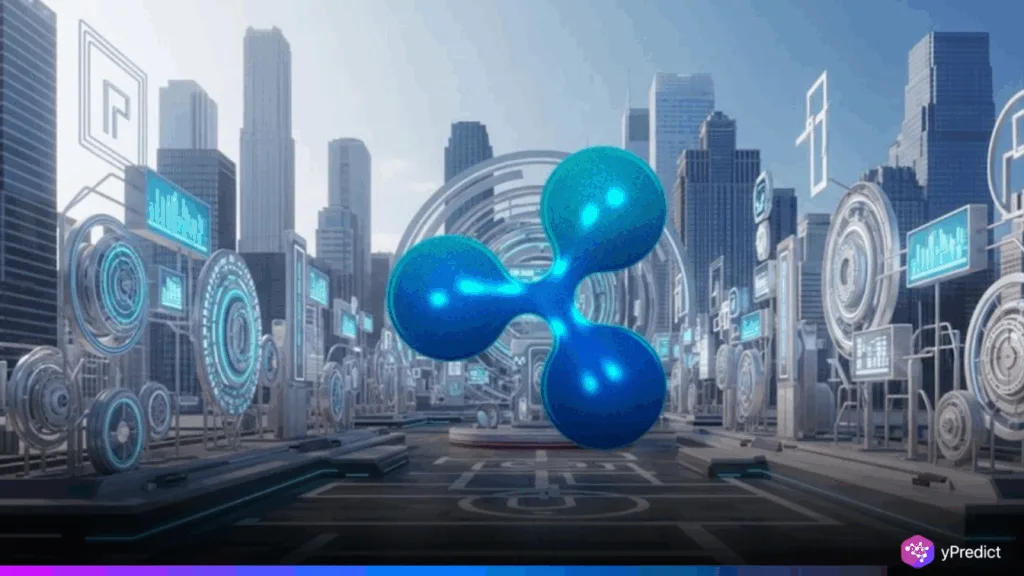
Ripple has also acquired a new release of the Accelerator Program aimed at developing artificial intelligence and the Ripple XRP ledger. Unveiled in July 2025, the program will attempt to accelerate blockchain innovation in AI-centric applications, specifically, decentralized finance (DeFi). XRP Ledger, a platform that supports high and low-cost transactions and fast performance, proposes a robust infrastructure foundation to test AI. Ripple is making this move part of an industry-wide shift in which AI is not only helping blockchain but also becoming a fundamental element of it. The initiative welcomes developers with the suggestion of new solutions through which AI could also improve efficiency, scalability, and decision-making within XRP-powered applications.
AI’s Role in Transforming DeFi Infrastructure
The XRP ecosystem will base its artificial intelligence on significant change, most notably DeFi. The projects that are likely to be carried out through the Ripple Accelerator Program can be used to automate smart contract management, predict market conditions, and enhance real-time risk assessment. Such applications may be able to solve age-old problems such as liquidity fragmentation and volatility through machine learning models, which make on-chain behavior dynamic. AI tools can also help with anomaly detection, observing network traffic in order to detect whether there is a potential threat or inefficiency on the fly.
Developers will be able to train such models on ledger data and generate AI systems that constantly improve and optimize the network performance and security. Further, AI might also provide an opportunity to automate compliance, which regulators are paying further attention to. Automatic interpretation and adaptation of legal frames to the system can mitigate human error and violation of the regulations. The purpose of Ripple appears to be straightforward: to allow logical automation to exist throughout the XRP Ledger, giving the ecosystem a cut above decentralized finance (DeFi) applications based on the Ethereum blockchain, which continue to rely on manual regulation or simple heuristics.
Technical and Regulatory Implications of AI Integration
The monetization of AI and its integration with a blockchain, such as the XRP Ledger, cannot go without obstacles, however. AI processing is resource-demanding, and blockchain environments require a consensus form of trust in real-time data processing, which is slow. The architecture of Ripple, which already supports 1,500 transactions per second, will give an advantage, but the scalability of it will also rely on the optimization of the deployment manner of AI models, either by on-chain or off-chain computation, or sidechains. Regulatory perspective of AI-driven DeFi poses uncertainty on the transparency of data, accountability, and explainability of models.
In case the AI-based decision-making automates the financial decisions, it is part of the necessary action to monitor their logic to make sure that it is compliant. The Ripple accelerator can be used to determine the industry best practices regarding the workings of blockchain-based AI systems, including their ways of logging activities, exchanging source data, and sustaining traceability. As regulation gets stricter across the globe, starting with the AI Act in the EU and extending to the SEC regulation of DeFi, it is no longer a choice whether or not to put these safeguards in place early. Providing it is successful, the project by Ripple might affect the legal framework in the future, proving that compliance and innovation can co-exist in an AI-adapted blockchain setting.
Ripple’s Vision for an AI-Enhanced Ledger Future
Ripple’s Accelerator Program signals a future where AI becomes deeply embedded in blockchain workflows. From optimizing consensus algorithms to personalizing financial services, artificial intelligence can drive meaningful efficiencies across the XRP Ledger. If the program succeeds in attracting talent and producing scalable solutions, it may reposition XRP as a platform not just for finance, but for intelligent, autonomous infrastructure. As 2025 progresses, this fusion of AI and blockchain will likely become a benchmark for how decentralized networks evolve and how they compete in an increasingly automated world.






